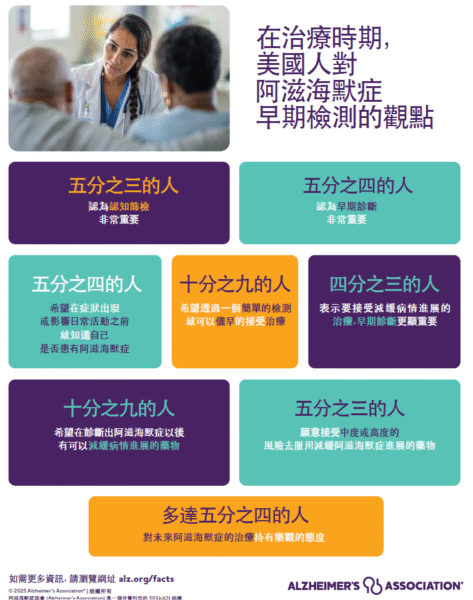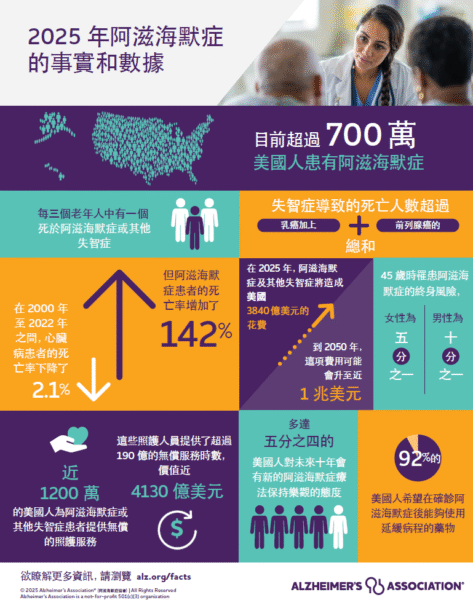美國人希望早期診斷和治療,並願意冒險以減緩疾病進展。報告還揭示了加利福尼亞州和全國最新的疾病相關統計數據。
隨著患有阿滋海默症的美國人數首次超過700萬,近五分之四的美國人希望在阿滋海默症影響他們的生活之前知道自己是否患病。只要能減緩疾病的進展,他們也希望接受治療,即使這些治療存在風險。這些是今天由阿滋海默症協會發布的2025年阿滋海默症事實與數據報告中揭示的見解之一。


2025年事實與數據報告深入探討了全國和各州關於阿滋海默症的最新統計數據,包括患病率、死亡率、失智症照護人員、照護成本和對照顧者的影響。加利福尼亞州的新疾病相關統計數據顯示:
- 65歲及以上患有阿滋海默症的加州居民數量:719,700
- 阿滋海默症導致的全州死亡人數:17,363
- 阿滋海默症的全州死亡率(每10萬人):44.5
- 擔任無償家庭照顧者的加州居民數量:1,396,000
- 提供的無償照護總時數:19億小時
- 無償照護的總價值:507億美元
“今年的報告發現,阿滋海默症對加州居民和家庭的影響是顯著的,” 阿滋海默症協會北加州和北內華達州分會執行董事Ken Toren說。“現在比以往任何時候都更需要推進疾病研究和治療,以減緩當前的發展趨勢,並幫助所有受阿滋海默症和其他失智症影響的加州家庭。”
新報告顯示,全國範圍內阿滋海默症的患病率、疾病相關死亡率和照護成本都在上升。調查結果包括:
- 720萬65歲及以上的人患有阿滋海默症。
- 2025年,照顧阿滋海默症和其他失智症患者的年度總成本(不包括無償護理)預計將達到3840億美元。
- 此外,近1200萬家庭成員和朋友提供了192億小時的無償照護,價值達4130億美元。
- 2000年至2022年間,阿滋海默症導致的死亡人數增加了一倍以上。
一份隨附的特別報告《治療時代的美國人對阿滋海默症早期檢測的看法》重點介紹了一項針對1700多名45歲及以上美國成年人的全國調查,調查了他們對阿滋海默症早期檢測和診斷的認識和態度、用於幫助診斷阿滋海默症的測試以及可以減緩疾病進展的治療方法。 調查結果包括:
美國人希望早知道自己是否患有阿滋海默症,並希望能夠進行檢測。
- 近五分之四的美國人(79%)希望在出現症狀或症狀影響日常活動之前知道自己是否患有阿滋海默症。
- 超過九成的美國人肯定或可能希望進行簡單的測試(例如基於血液的生物標誌物測試),如果這種測試可用。希望進行簡單測試的首要原因是允許早期治療和護理。
如果被診斷患有阿滋海默症,大多數美國人希望服用藥物以減緩其進展,並高度重視有關疾病和治療的信息。
- 超過九成的美國人(92%)在被診斷患有阿滋海默症後,可能或肯定希望服用能減緩疾病進展的藥物。
- 近三分之二的美國人(58%)表示他們願意接受中等或高風險的抗澱粉樣蛋白藥物以減緩阿滋海默症的進展。近四分之一的美國人(22%)願意接受高風險。
美國人對阿滋海默症檢測的主要擔憂是保險覆蓋範圍、準確性和成本。
- 44%擔心保險不會覆蓋未來的照護和治療。
- 其他主要擔憂包括測試準確性、成本、可能失去對能力的信心以及不被允許進行某些活動,例如駕駛。
美國人對未來十年將出現新的減緩、預防甚至治癒阿滋海默症的治療持樂觀態度。
- 五分之四的美國人(81%)相信未來十年將出現新的治療方法來阻止阿滋海默症的進展,66%相信很快將有新的治療方法來預防阿滋海默症。
“調查強調了推進新治療方法並使早期診斷更容易和更可及的重要性,” Toren說。“我們感到鼓舞的是,調查發現人們希望積極應對認知問題。這是一個真正的積極因素,因為阿滋海默症的早期診斷提供了最佳的照護、管理和治療機會。”
2025年阿滋海默症事實與數據報告的全文,包括隨附的特別報告《治療時代的美國人對阿滋海默症早期檢測的看法》,可以在alz.org/facts查看。
###
關於2025年阿滋海默症事實與數據
阿滋海默症協會2025年阿滋海默症事實與數據報告是一份全面的全國統計數據和訊息匯編,涵蓋阿滋海默症及相關失智症。該報告傳達了阿滋海默症對個人、家庭、政府和國家醫療系統的影響。自2007年首次發布以來,該報告已成為涵蓋阿滋海默症問題的首要來源。事實與數據報告是阿滋海默症協會的官方出版物。該報告每年在《阿滋海默症與失智症:阿滋海默症協會期刊》上發表。
關於阿滋海默症協會北加州和北內華達州分會
阿滋海默症協會是一個致力於阿滋海默症照護、支持和研究的全球志願健康組織。我們的使命是通過加速全球研究、推動風險降低和早期檢測,以及最大化優質照護和支持,來引領終結阿滋海默症和所有其他失智症的道路。我們的願景是實現一個沒有阿滋海默症和所有其他失智症的世界®。訪問alz.org或撥打800.272.3900。
New Alzheimer’s Association Report: Americans Want Early Diagnosis, Treatment and Are Open to Risk-Taking to Slow Disease Progression
As the number of Americans living with Alzheimer’s disease tops more than 7 million for the first time, nearly 4 in 5 Americans would want to know if they had Alzheimer’s disease before it impacted their lives. They also want treatment, even if it comes with risks, as long as it slows the progression of the disease. These are among the insights uncovered in the 2025 Alzheimer’s Disease Facts and Figures Report released by the Alzheimer’s Association today.
The 2025 Facts and Figures report provides an in-depth look at the latest national and state-by-state statistics on Alzheimer’s prevalence, mortality, dementia care workforce, costs of care and impact on caregivers. New disease-related statistics for California revealed the following:
- Number of California residents aged 65 and older living with Alzheimer’s: 719,700
- Statewide deaths from Alzheimer’s disease: 17,363
- Statewide mortality rate from Alzheimer’s (per 100,000 people): 44.5
- Number of California residents serving as unpaid family caregivers: 1,396,000
- Total hours of unpaid care provided: 1.9B
- Total value of unpaid care: $50.7B
“This year’s report finds that the impact of Alzheimer’s on California residents and families is significant,” said Ken Toren, executive director of the Alzheimer’s Association Northern California and Northern Nevada Chapter. “Now more than ever, we need to work to advance disease research and treatments that can slow the current trajectory and help all California families affected by Alzheimer’s and other dementia.”
The new report shows prevalence, disease-related deaths and cost of caring for those living with Alzheimer’s are rising across the country. Among the findings:
- 7.2 million people aged 65 and older are living with Alzheimer’s disease.
- Total annual costs of caring for people living with Alzheimer’s and other dementias (excluding unpaid care) is projected to be $384 billion in 2025.
- Additionally, nearly 12 million family members and friends provide 19.2 billion hours of unpaid care, valued at an additional $413 billion.
- Deaths due to Alzheimer’s disease more than doubled between 2000 and 2022.
An accompanying special report, American Perspectives on Early Detection of Alzheimer’s Disease in the Era of Treatment, highlights a national survey of more than 1,700 U.S. adults, aged 45 and older, examining awareness and attitudes of early detection and diagnosis of Alzheimer’s disease, tests used to help diagnose Alzheimer’s and treatments that can slow progression of the disease.
Among the findings revealed in the new survey:
Americans want to know early if they have Alzheimer’s disease and want access to testing.
- Nearly 4 in 5 Americans (79%) would want to know if they had Alzheimer’s disease before having symptoms or before symptoms interfere with daily activities.
- More than 9 in 10 Americans would definitely or probably want a simple test (e.g. blood-based biomarker test) if it was available. The number one reason for wanting a simple test is to allow for earlier treatment and care.
If diagnosed with Alzheimer’s, most Americans would want medication to slow its progression and would highly value information about the disease and treatment.
- More than 9 in 10 Americans (92%) would probably or definitely want to take a medication that could slow the progression of Alzheimer’s disease following an Alzheimer’s diagnosis.
- Nearly three in five Americans (58%) said they would accept a moderate or high level of risk with taking an anti-amyloid medication to slow the progression of Alzheimer’s disease. Nearly 1 in 4 Americans (22%) are willing to accept high risk.
Americans’ top concerns about Alzheimer’s testing are insurance coverage, accuracy and cost.
- 44% worry that insurance won’t cover future care and treatment.
- Other top concerns include test accuracy, cost, potential to lose confidence in abilities and not being allowed to do certain activities, such as driving.
Americans are optimistic that the next decade will bring new treatments to slow, prevent and even cure Alzheimer’s disease.
- Four in 5 Americans (81%) believe new treatments to stop the progression of Alzheimer’s will emerge in the next decade, and 66% believe new treatments to prevent Alzheimer’s will be available soon.
“The survey underscores the need for advancing new treatments and making early diagnosis easier and more accessible to anyone concerned about their memory and thinking,” said Toren. “We’re encouraged that the survey finds people want to be proactive in addressing cognitive concerns. That’s a real positive because early diagnosis of Alzheimer’s offers the best opportunity for care, management and treatment of the disease.”
Full text of the 2025 Alzheimer’s Disease Facts and Figures report, including the accompanying special report, American Perspectives on Early Detection of Alzheimer’s Disease in the Era of Treatment, can be viewed at alz.org/facts.
###
About 2025 Alzheimer’s Disease Facts and Figures
TheAlzheimer’s Association 2025 Alzheimer’s Disease Facts and Figures report is a comprehensive compilation of national statistics and information on Alzheimer’s disease and related dementias. The report conveys the impact of Alzheimer’s on individuals, families, government and the nation’s health care system. Since its 2007 inaugural release, the report has become the preeminent source covering the broad spectrum of Alzheimer’s issues. The Facts and Figures report is an official publication of the Alzheimer’s Association. The report is published annually in Alzheimer’s & Dementia: The Journal of the Alzheimer’s Association.
About the Alzheimer’s Association Northern California and Northern Nevada Chapter
The Alzheimer’s Association is a worldwide voluntary health organization dedicated to Alzheimer’s care, support and research. Our mission is to lead the way to end Alzheimer’s and all other dementia — by accelerating global research, driving risk reduction and early detection, and maximizing quality care and support. Our vision is a world without Alzheimer’s and all other dementia®. Visit alz.org or call 800.272.3900.


























